The Intel Optane SSD 900p 480GB Review: Diving Deeper Into 3D XPoint
by Billy Tallis on December 15, 2017 12:15 PM ESTRandom Read Performance
Our first test of random read performance uses very short bursts of operations issued one at a time with no queuing. The drives are given enough idle time between bursts to yield an overall duty cycle of 20%, so thermal throttling is impossible. Each burst consists of a total of 32MB of 4kB random reads, from a 16GB span of the disk. The total data read is 1GB.
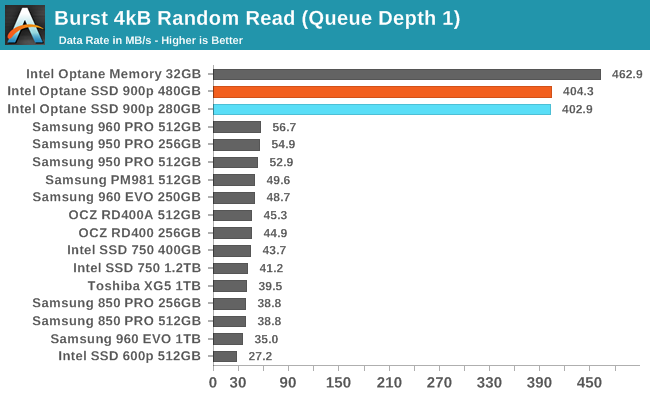
Random reads at queue depth 1 are where Intel's Optane products shine. Compared to the fastest NVMe SSDs using MLC NAND flash, the Optane SSDs aren't quite an order of magnitude faster, but only because the latency of the NVMe protocol over PCIe becomes the bottleneck. Intel's tiny Optane Memory M.2 cache drive is slightly faster in this one benchmark, but the difference hardly matters.
Our sustained random read performance is similar to the random read test from our 2015 test suite: queue depths from 1 to 32 are tested, and the average performance and power efficiency across QD1, QD2 and QD4 are reported as the primary scores. Each queue depth is tested for one minute or 32GB of data transferred, whichever is shorter. After each queue depth is tested, the drive is given up to one minute to cool off so that the higher queue depths are unlikely to be affected by accumulated heat build-up. The individual read operations are again 4kB, and cover a 64GB span of the drive.
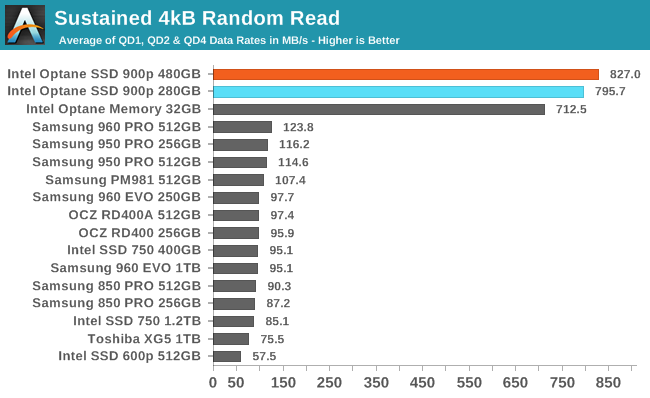
Adding some higher queue depths to the average shows a small speed advantage for the 480GB Optane SSD over the 280GB model, and the Optane Memory M.2 starting to fall behind the larger Optane SSDs. The NAND flash-based SSDs also pick up speed as queue depths grow, but they need to go far beyond QD4 to catch up.
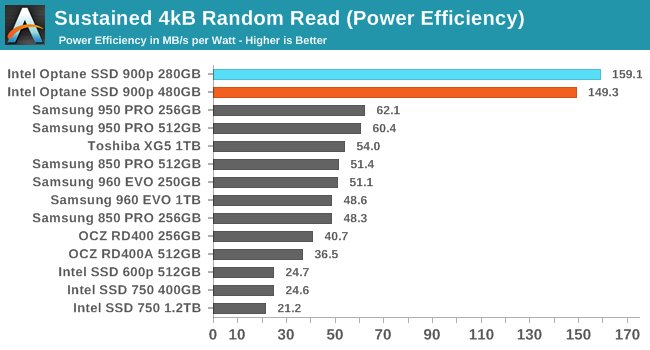
Given how thoroughly the Optane SSDs have shattered the record for random read performance, it's not too surprising to see them at the top of the charts for power efficiency when performing random reads. The 480GB Optane SSD is a bit less efficient than the smaller model because it has to power significantly more 3D XPoint memory chips with only a small performance boost to show for it. Compared to the flash-based SSDs, the Optane SSDs are only about 2.5 times more efficient, despite being about 7 times faster. The performance doesn't come for free.
 |
|||||||||
At low queue depths the two Optane SSDs offer nearly the same random read performance. When they both reach saturation at QD8, the 480GB model has slightly higher performance, and is drawing about 0.85W more power—a 13% power increase for a 7% performance boost.
Random Write Performance
Our test of random write burst performance is structured similarly to the random read burst test, but each burst is only 4MB and the total test length is 128MB. The 4kB random write operations are distributed over a 16GB span of the drive, and the operations are issued one at a time with no queuing.
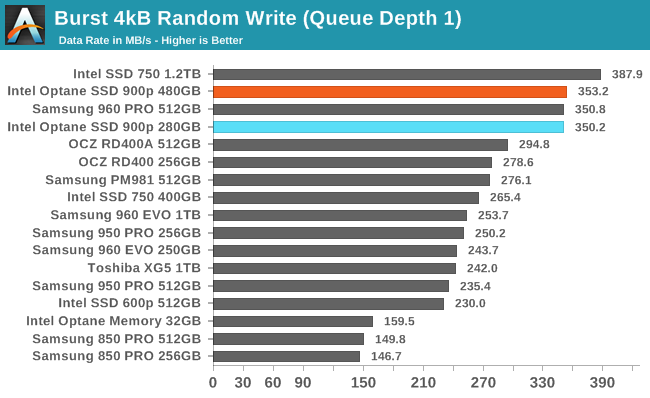
The random write performance at queue depth 1 of the Optane SSDs is great, but not record-setting. Flash-based SSDs can cache write operations in their DRAM and report the command as complete before the data has actually made it to the flash memory. This means that for most flash-based SSDs the burst random write speed is more of a controller benchmark than a test of the storage itself. The Optane SSDs don't have large DRAM caches on the drive and are actually writing to the 3D XPoint memory almost as quickly as the Intel SSD 750 can stash the writes in its DRAM.
As with the sustained random read test, our sustained 4kB random write test runs for up to one minute or 32GB per queue depth, covering a 64GB span of the drive and giving the drive up to 1 minute of idle time between queue depths to allow for write caches to be flushed and for the drive to cool down.
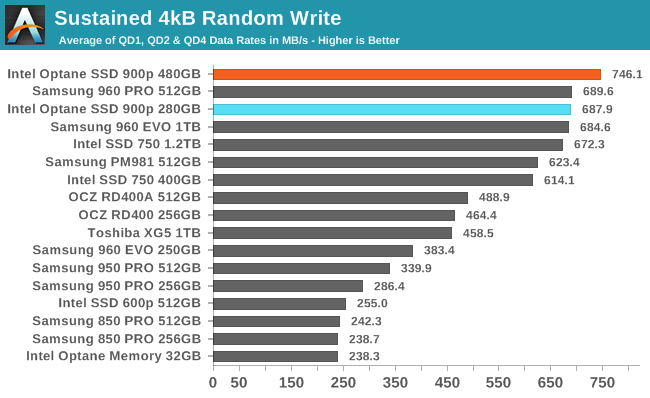
With larger queue depths and test durations long enough to defeat any DRAM-based write caching and many SLC write caches, the Optane SSDs rise to the top. With this second round of testing, the 280GB Optane SSD performed slightly worse than the first run, but it's still essentially tied with the fastest flash-based SSDs. The 480GB model is a tiny bit faster than even the previous record from the 280GB model, putting it about 8% faster than the Samsung 960 PRO.
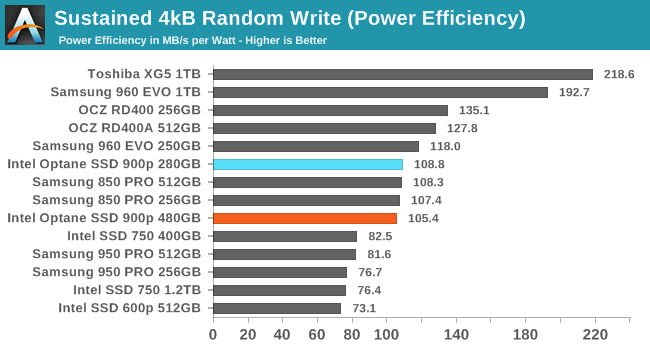
Without a huge performance lead, the high power consumption of the Optane SSDs takes a toll on their efficiency scores for random writes. They are ahead of early NVMe SSDs and on par with the fastest SATA SSDs, but the best current flash-based NVMe SSDs are substantially more efficient. The Toshiba XG5 prioritized efficiency over peak performance and ends up offering more than twice the power efficiency of the Optane SSDs, while the Samsung 960 EVO has a mere 77% efficiency advantage at essentially the same level of performance.
 |
|||||||||
As with random reads, the performance and power consumption gap between the two Optane SSD 900p capacities widens at higher queue depths. With power consumption starting at 5W and climbing to over 10W for the larger model, the Optane SSDs are in a completely different league from M.2 NVMe SSDs, which mostly top out around 4.5W.










69 Comments
View All Comments
Billy Tallis - Friday, December 15, 2017 - link
The ATSB tests are Windows-based, and the synthetic tests are on Linux with fio. I can't really create a RAM disk large enough to properly run the ATSB tests (at least not on this system), but I'll look into running the synthetic tests against a RAM disk.tuxRoller - Saturday, December 16, 2017 - link
Thanks so much for the response and clarification.I'll keep an eye out for that ramdisk comparison:)
Chaser - Friday, December 15, 2017 - link
In other words, if you are the enthusiast gamer person like many of the people that read this site, you're throwing money away buying this for your gaming system.jabber - Friday, December 15, 2017 - link
You are pretty much throwing away money investing in anything faster than a 850EVO in a gaming rig.eek2121 - Sunday, December 17, 2017 - link
Not really, as a gamer, you should not only be looking at performance, but at reliability as well. Ironically I say this NOT because the 8xx EVO is crap (my 840 evo still has 93% life left and that's despite being used as a system drive for many years), but because my 960 evo has had a metric ton of degradation in the 6 months I've owned it.Klimax - Sunday, December 17, 2017 - link
Only if one has few games. There's better solution: 16GB of RAM + large regular HDD (WD Black and similar, their sequential reads are very good). Only initial load will be noticeable. (Anytime after that, caching will take care of that)CheapSushi - Friday, December 15, 2017 - link
Umm, what? Optane would be the better drive in every single way for OS and general usage. If you were going to get ONE main drive, it should be Optane.ddriver - Friday, December 15, 2017 - link
Sure, but is 0.01% faster in real world performance worth being 300$ more expensive? If you are going with one main drive, you better get better capacity than performance you can't make any use of.tricomp - Saturday, December 16, 2017 - link
Here is what Tom wrote about Optane OS drive : "You will see and feel a performance benefit just by using the Optane SSD 900P as your operating system drive. The feel of the system changes even if you’re replacing a high-performance NVMe SSD. You will notice the increased responsiveness immediately and then gradually become accustomed to it. In our experience, you will take the performance for granted until you work on a slower PC. Then you'll wish it had an Optane SSD." Its main advantage - 4K read performance - makes it OS kingeek2121 - Sunday, December 17, 2017 - link
"Tom" has been gone for a long time. Tom's hardware, much like AnandTech, has simply become a vehicle for Purch Ads (sadly). The AnandTech or Tom's Hardware of today have absolutely nothing to do with the original founders/sites. I don't mean to sound anti-corporate (because I'm not), but Purch has allowed pretty much all of their sites to degrade to the point where they have become irrelevant. I mean no disrespect to any AT folks either. I'm sure they bust their asses off. However, IMO, Purch has taken some very valuable brands and driven them into the ground in a desperate reach for revenue.